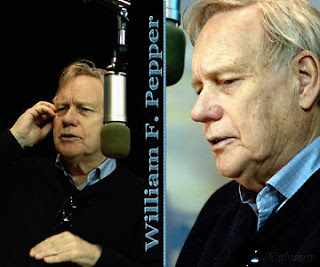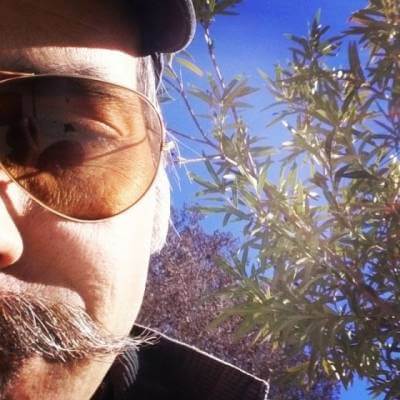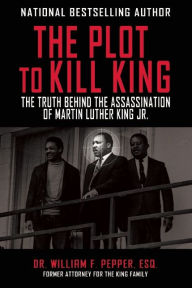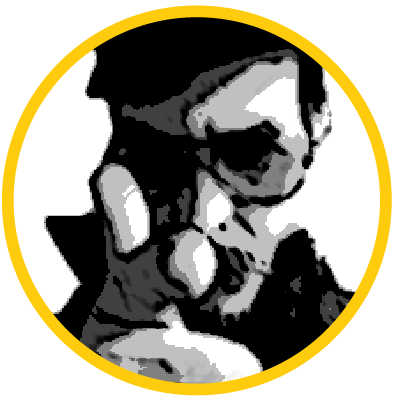John Barbours World, June 27, 2016
John Barbours World with John Barbour and guest William Pepper, and in the 2nd half, JP Sottile
Guest, William Pepper

William Francis Pepper is a barrister in the United Kingdom and admitted to the bar in numerous jurisdictions in the United States of America. His primary work is international commercial law. He has represented governments in the Middle East, Africa, South America, and Asia. Today, Pepper represents Sirhan Sirhan, the gunman convicted in the assassination of Senator Robert F. Kennedy in June 1968.
Bill Pepper was a friend of Martin Luther King in the last year of his life. Some years after King's death, Bill Pepper went on to represent James Earl Ray in his guilty plea, and subsequent conviction. Pepper believes that Ray was framed by the federal government and that King was killed by a conspiracy that involved the FBI, the CIA, the military, the Memphis police and organized crime figures from New Orleans and Memphis. He later represented James Earl Ray in a televised mock trial in an attempt to get Ray the trial that he never had.
He then represented the King family in a wrongful death civil trial, King family vs. Loyd Jowers and "other unknown co-conspirators." During a trial that lasted four weeks Bill produced over seventy witnesses. Jowers, testifying by deposition, stated that James Earl Ray was a scapegoat, and not involved in the assassination. Jowers testified that Memphis police officer Earl Clark fired the fatal shots. On December 8, 1999, the Memphis jury found Jowers responsible and found that the assassination plot included also "governmental agencies." The jury took less than an hour to find in favor of the King family for the requested sum of $100.
William Pepper is heavily involved in Human Rights Law, for a time convening the International Human Rights Seminar at Oxford University, during which time individuals such as Hugo Chavez, the President of Venezuela, accepted invitations to address the seminar. He lives in the US currently -not primarily- but travels frequently to England.
William Pepper’s lonely journey
Today, June 5th, is the 46th anniversary of the assassination of Robert F. Kennedy. The circumstances around his death are clear and convincing, and the evidence, including autopsy, ballistics, forensics and eyewitness clearly show that RFK was shot from behind by an unknown gunman (or gunmen) while people wrestled with Sirhan Sirhan in front of him*. There is no doubt about that.
The RFK assassination is perhaps the hardest to swallow, as it seemed at that time that hope died. There was no one else then, and none have stepped forth since to fill his shoes.
William Pepper has been Sirhan’s lawyer since 2007, and is struggling to get evidence into the legal system through an evidentiary hearing. He is blocked by a magistrate. His greatest fear is that Sirhan will be assassinated while in prison before this happens.
Pepper worked for James Earl Ray for 37 years. Ray died in 1998 from Hepatitis C. His was a preventable death – he was effectively killed by the Tennessee legal system when it refused to allow him access to health care. In 1999, having been blocked in all other venues, Pepper took on the family of Martin Luther King as clients, and sued a bar owner named Loyd Jowers (and other unknown conspirators) in Memphis court for the assassination of King. The trial lasted thirty days and over seventy witnesses appeared. The jury’s verdict was that Jowers did indeed participate in a conspiracy to do harm to Dr. Martin Luther King along with governmental agencies including the Memphis Police and Fire Departments, the FBI and United States military.
The transcript of that entire trial can be accessed here. Judge for yourself.
Remarkably, aside from a Memphis TV reporter, not one major American news outlet attended the 1999 trial. As Pepper says in the interview that follows, the American news media is “so well controlled” that the trial was not covered and most people don’t even know it took place.
I doubt Pepper is so dumb as to imagine we can have a real investigation of RFK’s murder in this country. We are far too corrupt, and no judge would allow a fair trial. Anyone sitting on the bench has an intuitive sense of where power lies, and knows that messing with the RFK assassination is inherently dangerous. People do not attain such positions without understanding our system. The only objective, then, is to keep the truth alive, as with passage of time lies become official history unless there are vigilant citizens working to expose them.
Below the fold here is a transcript of an interview with William Pepper from May 12 of this year. Again, as you read, please understand that the innocence of Sirhan Sirhan is not in doubt, that the evidence exonerates him in total, and that the whole of this matter is cock-blocked by both our courts and media silence.
_________________________________
*Many suspect, as I do, that Sirhan was firing blanks, since the real assassins were behind Kennedy and might have been hit by real bullets. However, there is no physical evidence to support this.
_________________________________
Host: Len Osanic
Guest: William Pepper, Attorney for Sirhan Sirhan
Date: May 12, 2014, Black Ops Radio
Osanic: Thank you so much for taking time to join me today. This coming June is going to be another anniversary of the assassination of Robert Kennedy. There are a lot of people tuning in. I have been doing the whole month, show after show, with all the various people who have been doing good work in the research, and of course I wanted to start with you.
I guess, highlight what we know about the assassination so many years later, and anything we can do about it, and of course people most likely know that you are handling Sirhan’s appeal. I guess we could start with that and go backwards. What is the latest state of the case?
Pepper: Well, there isn’t a great deal to report in that respect. The magistrate has been sitting on our petition now for going on to a year. He has refused to issue a recommendation to the court for, I guess now the last nine months. He did at one point issue a recommendation, a draft recommendation, and then invited comments, and we delivered and extensive response and comments and he has not moved since then. They changed the judge. We have a new judge. But this case is, of course, in the hands … of the magistrate. This magistrate has for all of these years been successful in avoiding [providing] an opportunity for a new trial, or even an evidentiary hearing which would enable us to put forward all of the new evidence that has surfaced.
So it’s not a happy situation for us, and we are caught in a very difficult situation because magistrates can take whatever time they need in these kinds of situations.
Osanic: I guess you would have to say this is on purpose. They don’t want to make a decision.
Pepper: I think they have a very serious problem. The evidence of Sirhan’s innocence is so overwhelming, and he was so badly represented at the original trial by a counsel who was himself under a pending indictment, a federal indictment, and who did not challenge the state’s ballistic evidence, did not put up any kind of a defense, but effectively just rolled over and allowed the guilty plea and, at that time, the capital punishment sentence to be issued. It was a horrific situation, both in terms of representation, and in terms of the evidence even then, particularly with a focus on the autopsy report that showed that Sirhan was innocent.
We have since done extensive work, bringing Dr. Dan Brown from Harvard, who a specialist in hypnoprogramming and [who] pretty much determined and put forward very strong cogent arguments that Sirhan was, in fact, hypnoprogrammed through the use of hypnotism and chemicals. And we have even, pretty much, now identified the place where that took place and the psychiatric team who were involved in programming him.
So they just don’t want evidence of this sort to see the light of day. By “they” I mean forces that have buried this political assassination and want it to remain underground until Sirhan passes away, presumably, or is assassinated himself in prison.
Osanic: Are you at liberty right now to discuss any of that hypnoprogramming? You said you know the location now …
Pepper: I can’t … anyone can go to the court record and can read our filings which include the statements of Dr. Brown. Those are available.
Osanic: OK. I will make a link. [Click on “read our filings” link at this location.]
Pepper: Yeah, you can make a link to put up on the website. I don’t want to get in to discussing those details. We believe that the whole process took place over a period of about two weeks. There are two missing weeks in the course of his history there. And so we believe that’s when it took place. But in terms of some of the other details, we would like an opportunity to be able to present them before a judge or before a judge and jury. And that’s basically where we are on the case at this point.
Osanic: Going back to the actual event, how did you come to represent Sirhan?
Pepper: I, as you know, have been involved in the assassination of Martin Luther King now for 37 years, and just basically finished the third book, a trilogy of work on that came that is the end of the story as far as that case is concerned, with the degree of detail and evidence that we have now … it’s so strong. I don‘t think there is a political assassination in history that has had the amount of evidence and information unearthed that we have in that case. But I was of course still involved in that case back in 2007 when Larry Peter, who was Sirhan’s counsel at the time, passed away. [I] was approached by people who had an interest in the case and by Sirhan’s brother, and I had assumed, in the King case, that [James Earl] Ray was innocent. I first met him in ’78 and it took me until ’88 to be convinced he was an unknowing patsy.
And I guess the gut reaction was the same in the case of the assassination of Bob Kennedy. But then when I was shown the evidence, I became convinced that that evidence was stronger than I had seen in the King case … of this man’s innocence. I mean, Bob was hit with three bullets from behind, the fourth one went through his shoulder [?pad?], and three of them hit him in the back – two in the back and one behind the ear at powder burn range.
And Sirhan … we have thirteen witnesses who placed him in front of the senator, never ever behind him, and another six who have sworn that they saw his hand pinned to the table – his shooting hand pinned to the table after the second shot. And he kept pulling the trigger with his hand down there but the bullets went all over the place. There’s no way that he could have put three bullets in Bob Kennedy at powder burn range from the rear. And the autopsy report itself is evidence of that.
So I took that case on at that point in time in 2007 and have been involved with it ever since. It’s not an easy matter to crack through the criminal justice system bureaucracy and force these cases to an evidentiary hearing, but that’s basically what we tried to do in the King case. We failed. Of course, James had a liver disease, hepatitis C, and even though I arranged a liver transplant for him at the University of Pittsburgh, Starzl Institute, I was denied the opportunity to take him there in Tennessee, and that of course was the final death sentence that James faced. We were not successful, and what we had to do eventually – I represented the King family – we all totally believed, the family and I believed that James was innocent. That’s why I got involved in that one.
We eventually did a civil trial where we sued one of the perpetrators in civil court in Memphis, and in a three-day trial with over seventy witnesses and all the evidence we had then, in 1999, was put forward. Most Americans – most people – do not know that trial ever took place because the mass media is now so well controlled, being subject to consolidated control, that that trial was not covered and most people don’t even know it took place.
So, we’re stuck in a similar situation with Sirhan. I believe the evidence is very strong and we are still before the court trying to get an evidentiary hearing, at least, so that there can be a record created. If we are denied we can take it up on appeal. If our petition is denied, we of course will go to the Ninth Circuit Court of Appeals and push form there. And the outcome can be anyone’s guess.
Osanic: Now what was the item that tipped the scales for you? You said that you kind of assumed that Sirhan may be innocent, but as you dug in to the material you found even more. What would be a point that tipped the scales for you? I mean, for myself, when I heard there were powder burns on the back of his head, I thought that’s crazy – how could you be in front and shot from behind?
Pepper: Yeah, well that’s really the most powerful piece of evidence – the actual physical and ballistics record in the case and the location of the shooter, the actual assassin, in comparison to where Sirhan was, plus the fact that the witnesses saw him in front and that his hand was pinned to the table and then the long sessions, over three years, that Dan Brown spent with him indicating clearly, both under hypnosis and in free recall, that he was effectively set up for this hit, a patsy, and he was controlled by a woman who was placed on the scene for that purpose on that evening.
It’s a cumulative amount of evidence that has come forward. And when you mix it all together and you look at the job that his previous lawyer did, the defense that he had, there is little doubt that the man was railroaded and has been in prison for a crime he didn’t commit – and I imagine are many, many other people. I got involved in this one – I’m not really an assassinations buff or anything but I’ve become involved in this whole phenomenon of political assassination because one goes back and looks at it, looks how it’s been used throughout history, not just in the Untied States in the 60’s, but throughout history, to remove people or leaders who could not be controlled. It’s a pretty persuasive activity for that purpose, and unfortunately, Bob Kennedy was about to be president in most of our views. I had known both Martin King in the last year of his life and Bob Kennedy. I had worked for Bob Kennedy in ’64 when he ran for the senate. I was his Citizens’ Chairman when he ran for the senate in Westchester County. I had a connection with both of them and they were two significant leaders that had to be removed.
Osanic: Fletcher Prouty had a line, he said assassination is a business, and assassination is the business of big business. This is something that would be astounding to people see this pattern you mentioned, removal.
Pepper: I think what we now see, in these assassinations, along of course with that of John Kennedy, which I’ve not gotten involved with or done much work on, or Malcolm X – that these assassinations in particular, one could view them as being prelude to oligarchy. And I think one has emerged following the sixties and into the seventies and up to the present time. It’s the development of an oligarchic state in America. I think representative democracy I is gone, and we’re in a situation where we are truly an oligarchy. And these events have certainly made it possible for this to happen.
That’s where we are. I think Paul Craig Roberts and others have also said that.
Osanic: What are a couple of issues and items of evidence that people should know about that are in this case? You mentioned the idea of hypnoprogramming and this is probably foreign to a lot of people. They may say “I’ve never heard of this before” but there are some of the issues here that people need to know about?
Pepper: Hypnoprogramming is nothing new. It’s not a new tactic or device. It goes back to the agency in developing these guilds back in the fifties some while after being created. It’s an ability to control behavior up to the point of creating assassins whose memories can be wiped clean of things that they have done and who can be controlled by the use of not just hypnotism – that’s where there’s a lot of confusion because you’re not just hypnotizing – but it’s a combination of the use of hypnosis, certainly and electronic invasion as well as chemicals. And the combination of these things has been used in various degrees and percentages for quite a long period of time to control individuals.
So that was evident in this particular case with the particular patsy. It was not used in the King case and there was a different system and style that have been used in that case, obviously equally effective when you can control the means of information, effectively the investigation. The coverup is easy – and the media as well, by the way, that does not get involved in investigative journalism anymore – you control their results and you control history. You rewrite history and you write it for future generations. That is where we are.
In terms of the events in this case, it’s pretty clear that one can just read the autopsy report and get the details on how Bob Kennedy was killed, where the fatal bullet was, how it was fired, how close the pistol was to behind his ear as well as the shots in his back. That is powerful, powerful evidence. So we’re just looking for a chance, obviously, to put it forward and we’ve not gotten there yet, and I don’t know that we will. We struggle. We just hope that he is not killed in prison. That’s a problem.
Osanic: Sandy Serrano spoke of this woman in the polka dot dress. Are we any closer to identification of that person?
Pepper: Yes.
Osanic: OK. So that’s something that would come out in trial.
Pepper: [laughs] it could very well be, yes.
Osanic: That’s excellent news. So, the thing is that you are actually sitting on a large amount of information that exonerates him, and the legal system is actually very reluctant to let this out at all. It would just be another instance of, well, they have been lying to us about this, what else have them been lying to us about?
Pepper: Sure, that is the case. That is certainly the case. We just plug away and hopefully we will get a ruling or recommendation from the magistrate and then a ruling from the judge so we know where we can go. Obviously right now we don’t have it. That’s where we are.
Osanic: Do you have any opinion as to the motive for removal of Bobby Kennedy – he was somebody that was going to make changes, he had mentioned that if elected he would reopen the investigation into his brother’s murder? Do you have any comments about that?
Pepper: Bob Kennedy was somebody who was out of control, for the ruling forces of this society. He was going to reopen the investigation of his brother’s death. He was going to end the war in Vietnam, which would have saved probably another thirty thousand [American] lives if he had gotten in. That’s the additional number we lost between ’68 and when the war ended in ’75. He was going to go probably in a different direction in terms of the economic needs of the masses of people in this country, and would have been a vibrant force for continuation, rejuvenation of democracy.
He was unacceptable, from a whole range of standpoints, and he had to be removed. Los Angeles was the place picked for that to take effect.
Martin King was actually supposed to have been killed in Los Angeles, and they moved that one finally into Memphis. Martin was in Los Angeles, they kept James Earl Ray there for a long time, and then eventually they switched. I guess, logically, you couldn’t have two major assassinations in the same city. They had to change locales, and Memphis was always high on the list because of [former FBI agent and Director of Memphis Police and Fire Departments Frank C.] Holliman, who had run Hoover’s office and who had been special agent in charge for a period of time, and then who was returned as director of police and fire.
Memphis was a very good place this type of activity, as well as was Los Angeles, witness the official history (laughs).
Osanic: You mentioned this new book is about to be released you’ve just wrapped it up, so I’d be very interested to have you one another time to specifically talk about that. But I guess as we wrap up today, maybe wrap up Bobby Kennedy, and what he meant America at that time, and this assassination by this unknown person who turns out not to have any memory at all of the event, is – if you’re from another country you just scratch your head and wonder how can this go on?
Pepper: I think that’s true. Very difficult situation. Bob Kennedy was, in my view, one of the last hopes that could have been a force for democracy and justice in this land. When they took him from us, as they took Martin from us, we were just increasingly set back. That’s why I think that those sage voices who see us in oligarchic situation are probably correct at this point in time. It’s likely to get a lot worse before it gets better.
On that sad note, that’s pretty much where I see us.
Osanic: There doesn’t seem to be anybody on the horizon that is even a glimmer of hope.
Pepper: No.
Osanic: Catastrophic colossal letdown of Barack Obama – the only person on the horizon is a Hillary Clinton [this is snark], the whole thing is … I’ll just leave it like that. I don’t know what to say about the state of our world. Thank you so much for your time and effort trying to do the right thing, to expose these assassinations of the 1960’s – at least if we learn from them, what is the state of research, what are the facts that are known today, and we’ll figure what we can do about that, but for now just try to make an effort to bring those responsible at least to the information age so people can realize that this is what did happen. And you certainly did that with the trial in Memphis where you brought out so much information. You can’t do anything about it now, like you mentioned, with James Earl Ray passed away, the one dollar settlement – it’s not about money. Here’s what happened.
The same thing with Bobby Kennedy and Sirhan sitting in a jail cell not having memory of it, gunshots from different directions, the evidence destroyed, maybe the [Polish reporter Stanislaw] Pruszynski tape, that will offer additional evidence as well to the number of gunshots fired. I think the timing of the shots too is very important piece of evidence.
Pepper: The direction of the shots also. That scientific study showed not only that there were about thirteen shots fired, but that they came from two different directions. That’s very important to understand. Sirhan was firing one direction, but the actual shots killed Bob were fired in exactly the opposite direction, since Bob was facing Sirhan. All of those things would be fully aired if we had opportunity to get into a court room.
So anything anyone can do to run to the federal district court and the magistrate in Los Angeles urging that we be given that opportunity would be greatly appreciated.
Osanic: How can someone do that?
Pepper: Well, they can write. They can write letters. Magistrate does not like to receive letters. I’m not really technically supposed to encourage people to bombard the magistrate, but there’s nothing to prevent people from demonstrating, making contact from actually trying to get a hold of a link – this is where you can help, to do a link to all of our filings so that anyone who is interested can follow.
The Plot to Kill King: The Truth Behind the Assassination of Martin Luther King Jr. Hardcover – June 21, 2016
by
William Pepper was James Earl Ray’s lawyer in the trial for the murder of Martin Luther King Jr., and even after Ray’s conviction and death, Pepper continues to adamantly argue Ray’s innocence. This myth-shattering exposé is a revised, updated, and heavily expanded volume of Pepper’s original bestselling and critically acclaimed book Orders to Kill, with twenty-six years of additional research included. The result reveals dramatic new details of the night of the murder, the trial, and why Ray was chosen to take the fall for an evil conspiracy—a government-sanctioned assassination of our nation’s greatest leader. The plan, according to Pepper, was for a team of United States Army Special Forces snipers to kill King, but just as they were taking aim, a backup civilian assassin pulled the trigger.
In The Plot to Kill King, Pepper shares the evidence and testimonies that prove that Ray was a fall guy chosen by those who viewed King as a dangerous revolutionary. His findings make the book one of the most important of our time—the uncensored story of the murder of an American hero that contains disturbing revelations about the obscure inner-workings of our government and how it continues, even today, to obscure the truth.
Guest, JP Sottile

JP SOTTILE is a freelance journalist, published historian, radio co-host and documentary filmmaker. His credits include a stint on the NewsHour news desk, C-SPAN, and as a newsmagazine producer for ABC affiliate WJLA in Washington. Joseph “JP” Sottile is a two-time Washington Regional Emmy Award Winner. Documentary film credits include: writer, director, producer of The Warning and various production and photography credits on other public interest films. His weekly show, Inside the Headlines w/ The Newsvandal, co-hosted by James Moore, airs every Friday on KRUU-FM in Fairfield, Iowa. He is the Newsvandal.
John Barbours World

John Barbour "the godfather of reality TV" created, co-hosted, co-produced, and wrote 'Real People' - the first reality show, which was number one on NBC for three years during the early 1980's.
Barbour moved to the United States in the early sixties. His comedy act, particularly his 1965 album, It's Tough to Be White, dealt in part with civil rights and black-white relations.
Barbour hosted the pilot for The Gong Show in the mid '70s, and was a regular panelist on the 1988 Canadian (US syndicated) version of Liar's Club.
Barbour portrayed game show host Harry Monte in a 1975 episode of Sanford and Son.
John Produced, Wrote, and Hosted 'Ernie Kovacs: TV's Original Genius,'for Showtime that aired later on PBS. At the time it was reviewed as 'the best documentary about a performer!'
He also directed and wrote the 1992 documentary The JFK Assassination: The Jim Garrison Tapes. This film covers the investigation of District Attorney Jim Garrison, who, after the 1963 assassination of John F. Kennedy, decided to further investigate the official report given by the Warren Commission. The documentary hypothesizes connections between the assassination and the FBI, the CIA, the Mafia, the Cuban Missile Crisis, the Vietnam War, and other organizations and foreign affairs issues. The film won an award in 1993 at the San Sebastian Film Festival in Spain.











